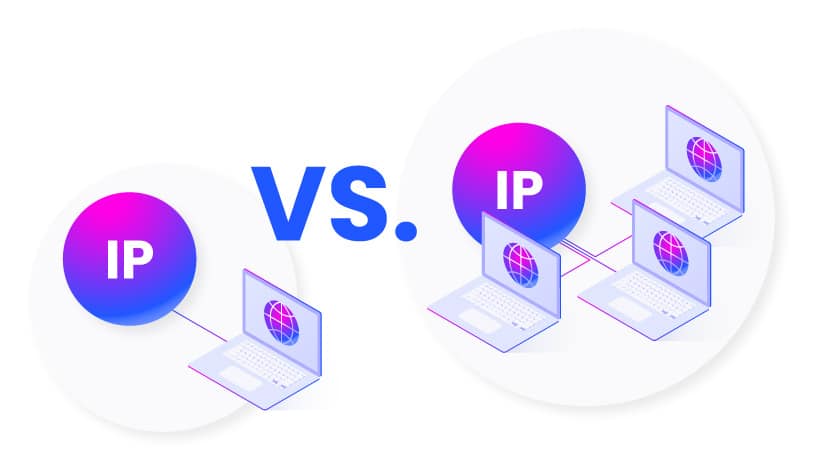Dedicated IP and Shared IP are two types of IP address setups commonly found in online services. Let’s compare the two:

1. Dedicated IP:
A dedicated proxy IP is an internet protocol (IP) address assigned solely to a single user or entity. In the context of proxy servers, which act as intermediaries between a user’s device and the internet, a dedicated proxy IP means that the IP address is exclusively used by one individual or organization.
**Advantages**:
– Reliability: With dedicated IPs, there’s less chance of encountering issues associated with multiple users, enhancing reliability.
– Reputation Management: Users have more control over their dedicated IP’s reputation, which is crucial for tasks like email marketing or hosting websites.
– Access Control: Dedicated IPs offer better security and access control since they’re reserved solely for authorized users.
**Disadvantages**:
– Cost: Dedicated IPs tend to be pricier due to the need for dedicated resources.
– Limited Anonymity: Since dedicated IPs are tied to specific users, they offer less anonymity compared to shared IPs.
2. Shared IP:
A shared proxy IP is an internet protocol (IP) address that is used by multiple users simultaneously. In the context of proxy servers, which act as intermediaries between a user’s device and the internet, a shared proxy IP means that the same IP address is shared among several users.
**Advantages**:
– Cost-Effectiveness: Shared IPs are more budget-friendly as the costs are divided among multiple users.
– Anonymity: Shared IPs provide a degree of anonymity since activities are pooled with other users, making individual tracing challenging.
– Flexibility: Shared IPs are often bundled with hosting plans or VPN services, offering a convenient solution.
– **Disadvantages**:
– Reputation Risks: Shared IPs may suffer from reputation issues if any user on the IP engages in malicious activities, impacting all users sharing that IP.
– Resource Sharing: Users on shared IPs might experience performance issues if others on the same IP consume a large share of resources.
In conclusion, the choice between dedicated and shared IP addresses hinges on factors like cost, reliability, anonymity needs, and the specific application. Dedicated IPs provide more control and reliability but come at a higher cost, while shared IPs are economical but may pose risks like reputation damage and resource sharing.